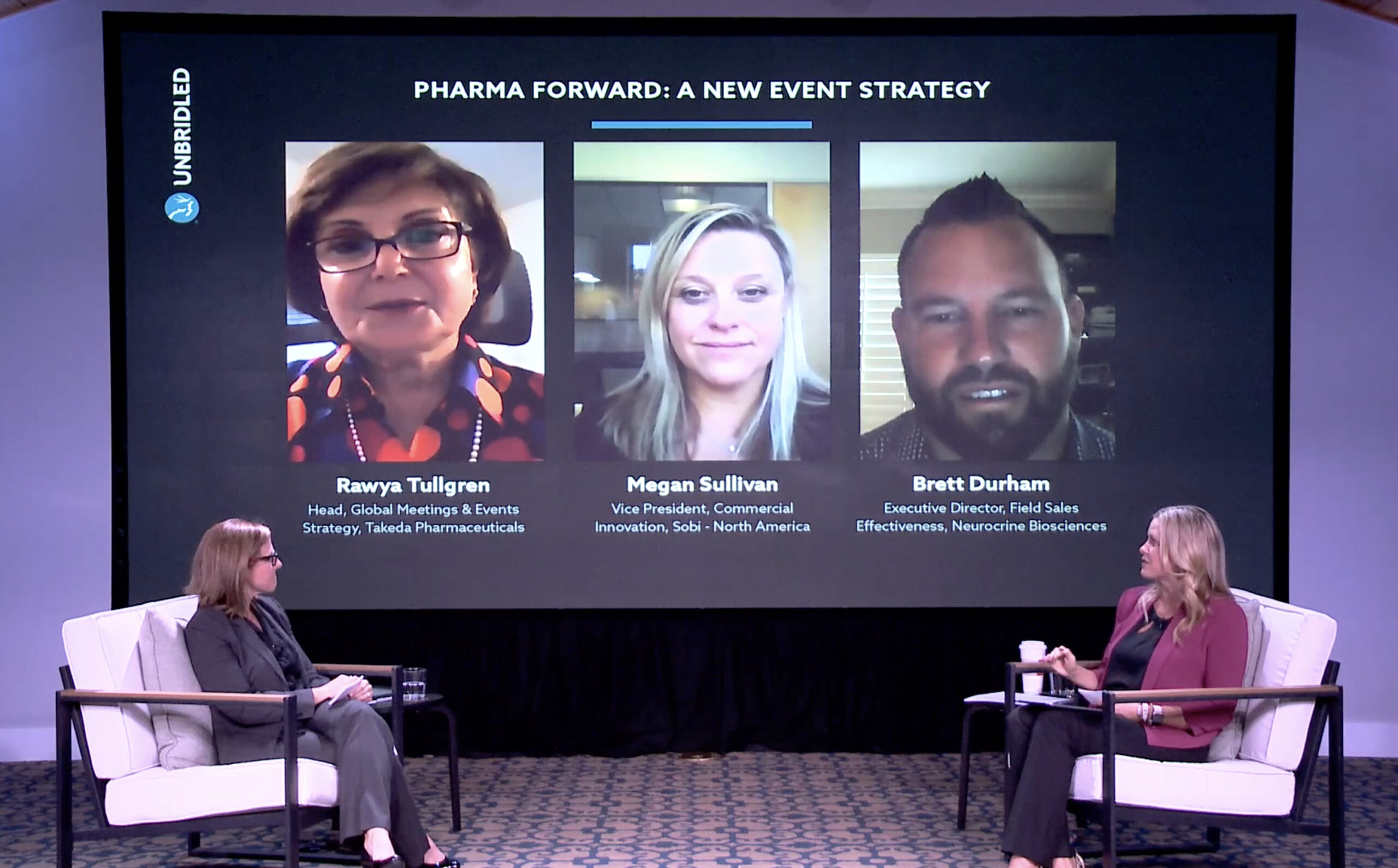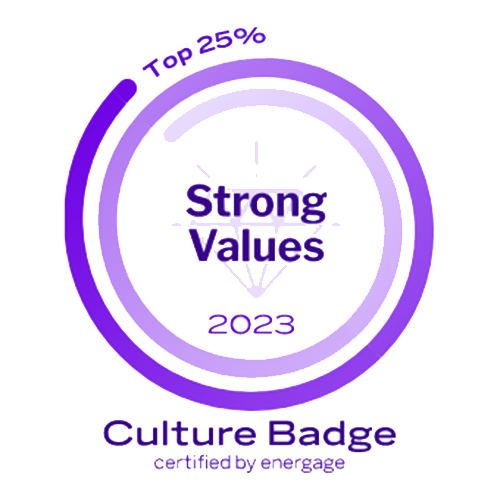“41% of respondents believe up to a third of their meetings will remain virtual going forward”
Pharma Forward: How industry events are evolving
In Unbridled’s recent webinar, Pharma Forward: A New Event Strategy, two members of our leadership team, Regional Vice President Stephanie Grey and Director of West Coast Operations Jen Kamins, conducted an in-depth interview with a panel of pharma industry execs to discuss how events will change in the coming months.
During the show, attendees were polled on a series of questions relating to the current and future state of events. Their responses, along with those of the panelists, provide insight into where meetings are likely headed as we approach 2021.

Back in March, when events were first being cancelled due to COVID-19, when did you think in-person meetings would resume?
A vast majority of attendees thought in-person events would resume in 2020, with 46% of respondents assuming meetings would return in the fall and 36% thinking they’d come back in the summer. A mere 14% said they expected events to be delayed until 2021.
What inspired this early wave of optimism? While some people underestimated the virus’ staying power, others may have overestimated society’s ability to conduct business as usual in the midst of a pandemic. Not since the 1918 Spanish flu has the world faced a virus strain of such severity, and the immediate impact of that outbreak was somewhat diminished as it occurred in the shadow of the first World War.
To put it simply, no event in recent history has prepared us for a moment like this. We aren’t accustomed to dramatically changing our behaviors for months on end, let alone a year or more. In the early days of 2020, it must have seemed unimaginable that we’d still be avoiding crowd contact by the holiday season.
While scientific researchers are hopeful that we’ll have several vaccines ready to distribute by early 2021, a number have also stated that life may not return to normal until 2022. Though we have a far greater understanding of the virus now than we did back in March, a cloud of uncertainty still looms. In the meantime, planning hybrid events has become a popular fail-safe as we prepare to transition back to relative normalcy next year, and our guests agreed that giving attendees the option to participate in meetings remotely will be a standard practice going forward.
What percentage of your meetings were completely virtual prior to COVID-19?
In a near-unanimous response, 97% of the people we surveyed said no more than 10% of their meetings were virtual before this year. We can infer that many among them had not attended any virtual meetings prior to COVID-19. The remaining 3% said over half of their meetings were virtual before the outbreak, an indicator of consistent remote work. This is consistent with worldwide data that shows the massive surge in interest over time of the term “virtual event.”
Now that nearly everyone has been exposed to virtual meetings, the next question is whether these digital events remain once the pandemic abates. After spending months talking over Zoom, most people are eager to return to live events. Still, virtual meetings do offer their own unique advantages, though it seems some gatherings are best conducted in person.
“There are some clear benefits to virtual: the lack of travel; you’re going to save a couple bucks in hotel and airfare, for sure,” said Brett Durham, an executive director at Neurocrine Biosciences. “But there are some things you really can’t get back, and number one is the culture aspect. Just the connections, the hanging out at night, the team-builders we do live—all of that bonding and culture building.”
In the future, it will be interesting to see if companies continue to host virtual events for certain functions, like training programs or small-group exercises, while reserving in-person conferences for large meetings or culture-focused assemblies. Speaking of which…

Google Trends for the term “Virtual Event”
“One of the areas that we’ve seen such great impact has been with the patients and the patient communities. A lot of folks weren’t able to travel previously. We’re able to hear from a lot more patients and a lot more customers than we’ve ever thought before.”
What percentage of your meetings do you think will remain virtual after the pandemic has passed?
Most people believe virtual events are here to stay, at least for a while. 41% of respondents believe up to a third of their meetings will remain virtual going forward, while 33% say virtual meetings could make up half of their events.
“I can see there being at least 20 percent [of meetings] that stay virtual even if the pandemic is gone,” said Megan Sullivan, VP of Commercial Innovation at Sobi – North America. “One of the areas that we’ve seen such great impact has been with the patients and the patient communities. A lot of folks weren’t able to travel previously. We’re able to hear from a lot more patients and a lot more customers than we’ve ever thought before.”
As individuals who work in healthcare, our panelists take the safety and satisfaction of their clients seriously. Rawya Tullgren, Head of Global Meetings & Event Strategy at Takeda Pharmaceuticals, also noted that a virtual format may be best suited for certain meetings, depending on the event’s size and subject matter. This comment speaks to the growing understanding, experience, and value for the utility of virtual events in a company’s overarching event strategy.
“Virtual meetings are here to stay,” she said. “We have to look at the scope. We have to determine whether [the meeting] is best done virtually, or in person, or hybrid.”
What is your biggest concern when hosting a hybrid event?
For this question, attendees were given six pre-determined options to choose from, though two answers in particular received a clear majority of votes. Over two-thirds of respondents said the inclusion of remote attendees was their biggest concern. The second-most popular answer, with 20% of the tally, was the safety of attendees and stakeholders.
The ability to maintain company culture received 6% of the vote, while industry perception and budget each received 3%. The sixth and final answer, no concerns at all, received no votes. Hybrid events are a relatively new concept to most people, and it’s not surprising attendees have some reservations about their novel format.
Concerning the inclusion of remote attendees, Stephanie Grey elaborated, “Making sure that they feel included but also […] making them feel that it’s okay to be remote—I think that’s going to be a really big challenge for all of us.”
We’ve assembled some helpful tips for creating hybrid events that make both in-person and remote attendees feel engaged. It’s equally important to reassure employees that tuning in remotely is a perfectly viable option; these events are hybrid for a reason, after all. Simple as it may sound, this approach is the best way to ensure your stakeholders feel safe and validated.
Just the beginning
We had a fantastic time talking with our panelists and gathering insights from our audience members. As much content as we’ve managed to cover here, this blog only touches the surface. To view our complete webinar, you can access our video archive here. Register for the series to receive a notification whenever a new show is about to go live. We hope to see you next time!










